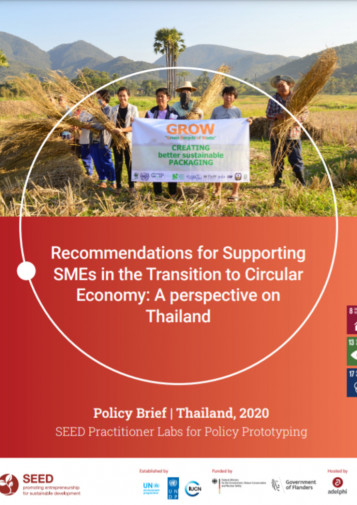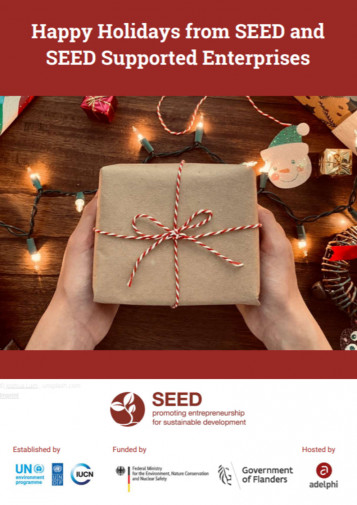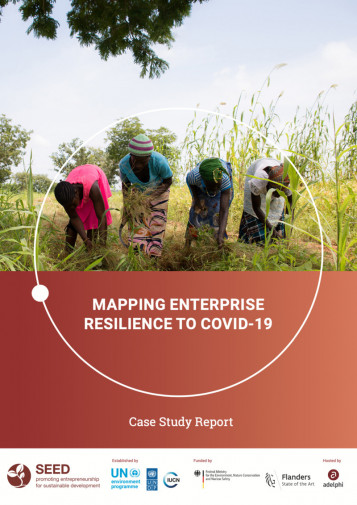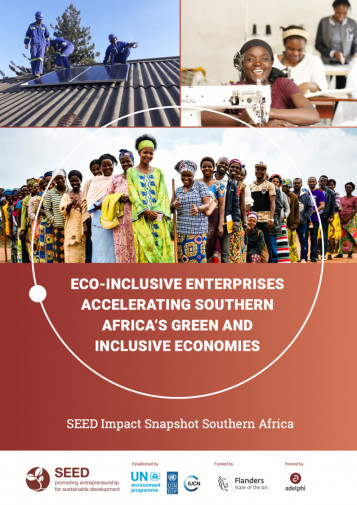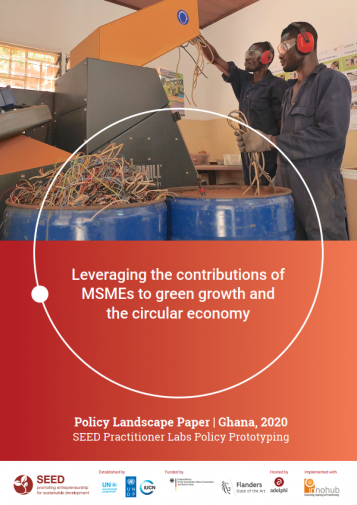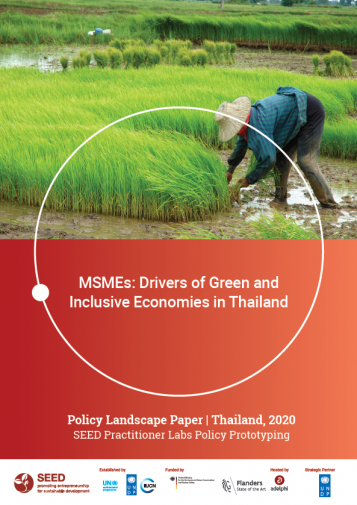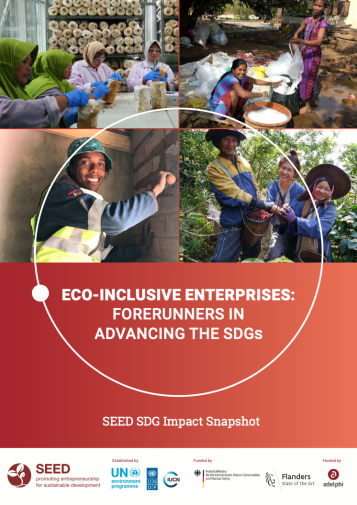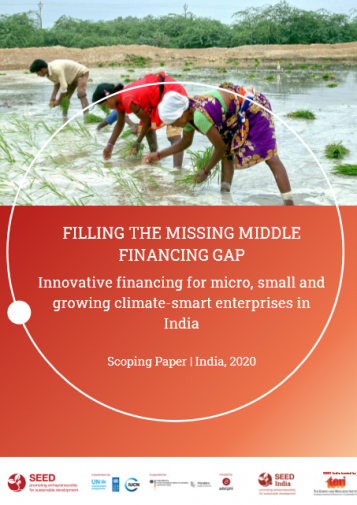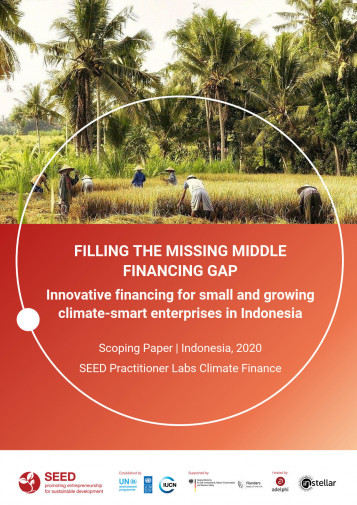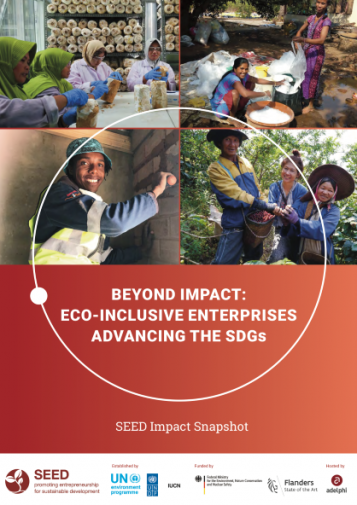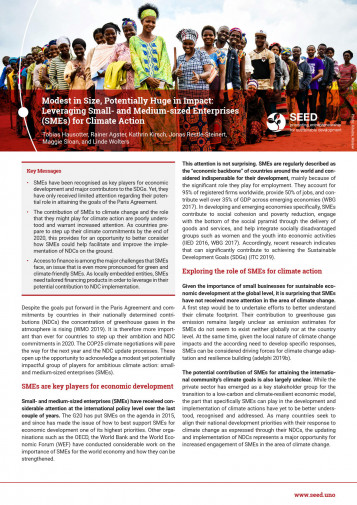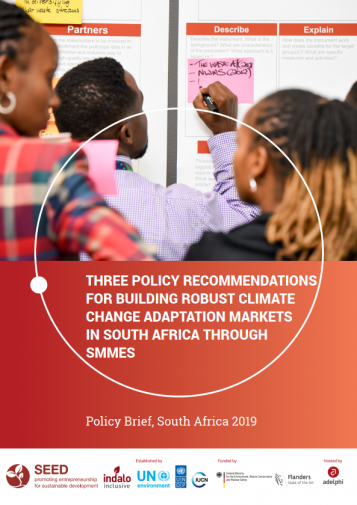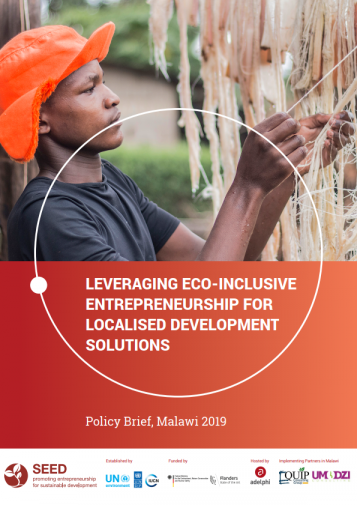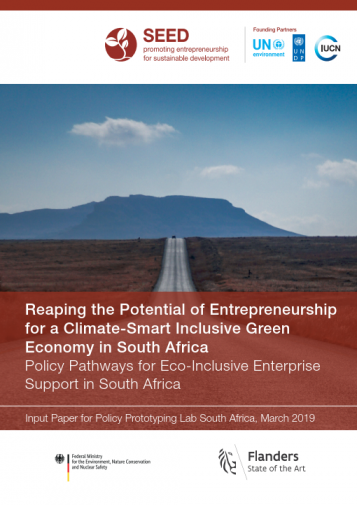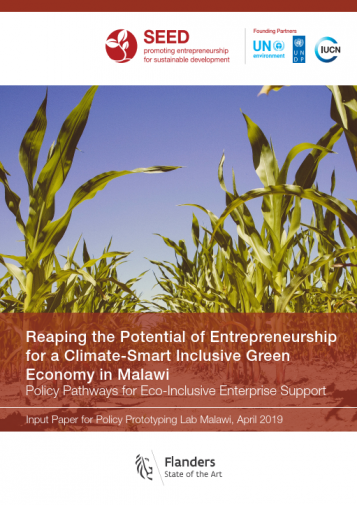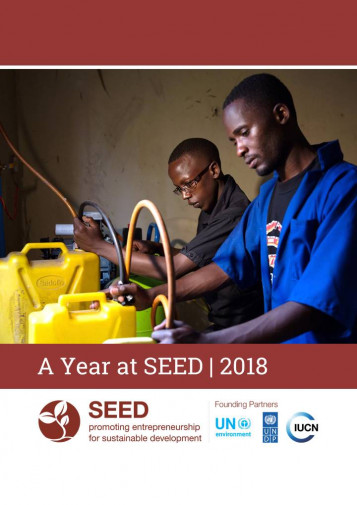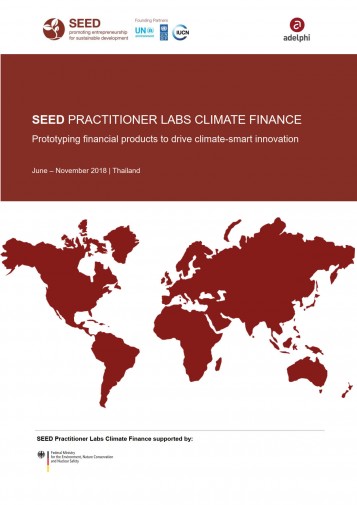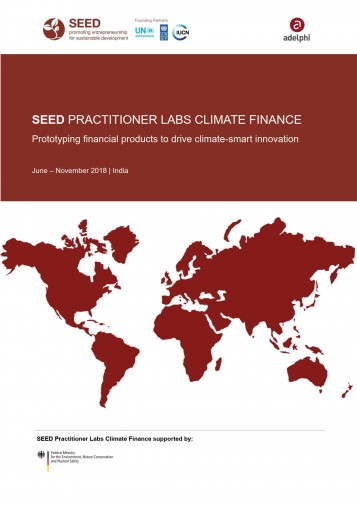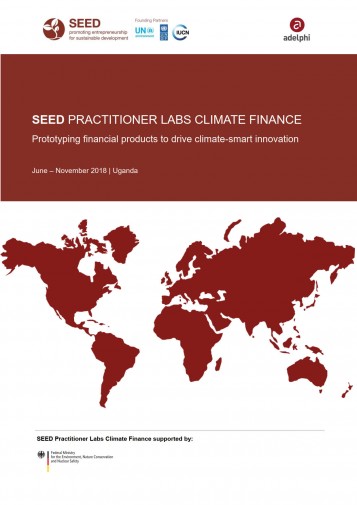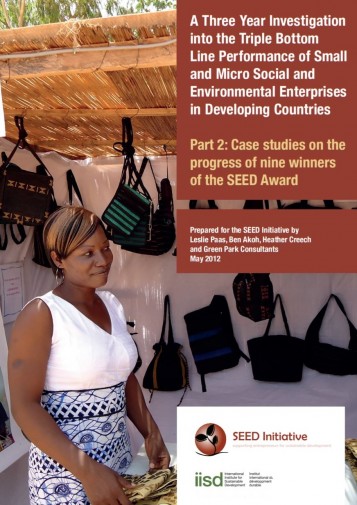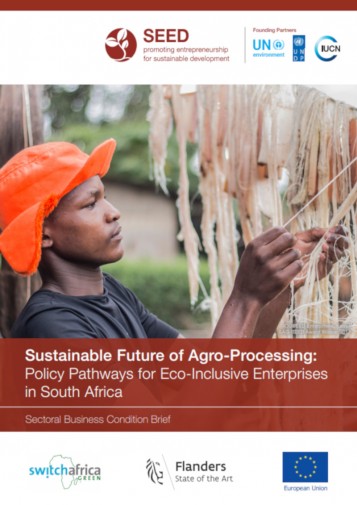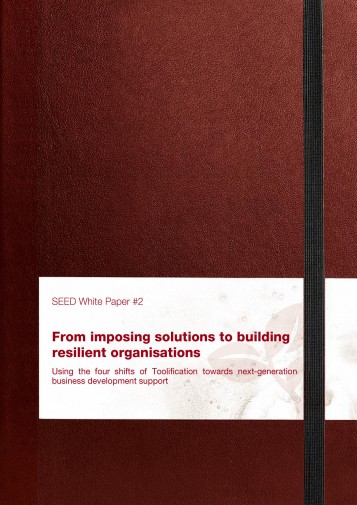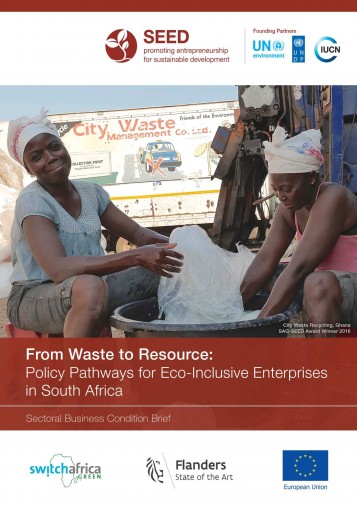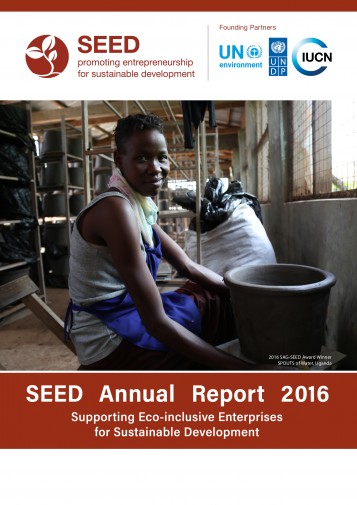Phasing out Single-Use Plastic (SUP) Creating a New Default | Thailand, Policy 2020
Published: 07 January 2021 Linde Wolters, Sonya Ong, Supapim Wannopas
Phasing out single-use plastics (SUP) in Thailand demands a commitment from different sector stakeholders - the private sector, as producer and purchaser of the material, plays an influential role in providing alternatives and realising sustainable consumption and production. Read more
SDGs:

Recommendations for Supporting SMEs in the Transition to Circular Economy | Thailand, Policy 2020
Published: 07 January 2021 Linde Wolters, Sonya Ong, Supapim Wannopas
This Policy Brief from SEED's Practitioner Labs for Policy Prototyping highlights the Stockholm Environment Institute (SEI)'s research on the barriers and challenges faced by the private sector hindering a transition towards sustainable production and adoption of circular economy business models. Read more
SDGs:





Shop sustainably this holiday season with SEED: A gift guide from our eco-inclusive enterprises
Published: 03 December 2020
The holidays are approaching and like many others around the world, SEED is searching for a way to send gifts and joy to our loved ones from a safe social distance. Read more
Mapping Enterprise Resilience to COVID-19
Published: 07 September 2020 Elena Eckhardt, Linde Wolters, Mirko Zürker, Supapim Wannopas
Resilience is an indispensable tool to help MSMEs prepare for the unknown, especially now when COVID-19 induced curfews and lockdowns expose MSMEs to new vulnerabilities. With fewer resources and access to information than larger companies, MSMEs in emerging markets have experienced severe disruptions to their businesses, with around 42% worldwide facing potential failure within six months.
This report demonstrates how MSMEs, particularly eco-inclusive enterprises, are weathering the COVID-19 pandemic and how governments and intermediaries can lend support. In this report we outline six essential resilience factors and good practices that SEED’s eco-inclusive enterprises have employed in emerging markets. Our SEED enterprises serve as an excellent example of how other enterprises can incorporate resilience into their business models in the face of the pandemic and to become more adaptable for future shocks. Read more
This report demonstrates how MSMEs, particularly eco-inclusive enterprises, are weathering the COVID-19 pandemic and how governments and intermediaries can lend support. In this report we outline six essential resilience factors and good practices that SEED’s eco-inclusive enterprises have employed in emerging markets. Our SEED enterprises serve as an excellent example of how other enterprises can incorporate resilience into their business models in the face of the pandemic and to become more adaptable for future shocks. Read more
Eco-Inclusive Enterprises: Accelerating Southern Africa’s Green and Inclusive Economies
Published: 02 September 2020
Micro, Small, and Medium Enterprises (MSMEs) provide 50% of jobs, contribute to over 35% of the GDP in emerging economies, and overall make up 90% of registered firms across the world. They are especially impactful in emerging economies as they work toward inclusive growth and equality for marginalised populations. At SEED, we focus on growing eco-inclusive enterprises which in turn contribute socially, economically, and environmentally to empowering the 5.2 billion people at the bottom of the pyramid worldwide.
This report examines the yearly impact of 80 of our eco-inclusive enterprises in three of our SEED countries: Zambia, Zimbabwe, and Malawi. These locally embedded enterprises, 51% of which are women-led, demonstrate that driving the Sustainable Development Goals (SDGs) can indeed be profitable and with a success rate of 82.5% still in business, they show long-lasting impact in each of their communities and sectors. Read more
This report examines the yearly impact of 80 of our eco-inclusive enterprises in three of our SEED countries: Zambia, Zimbabwe, and Malawi. These locally embedded enterprises, 51% of which are women-led, demonstrate that driving the Sustainable Development Goals (SDGs) can indeed be profitable and with a success rate of 82.5% still in business, they show long-lasting impact in each of their communities and sectors. Read more
SDGs:























Leveraging the contributions of MSMEs to green growth and the circular economy in Ghana | Policy Landscape Paper
Published: 01 September 2020 Camilla Shearman, Doris Awortwi-Tandoh, Julia Haack, Kodjo Barnor, Letitia Varney, Linde Wolters, Thomas Wiredu
The policy context as it relates to MSMEs in Ghana is in a state of transformation. With a new MSME Policy on the horizon that seeks to align and coordinate efforts to support this stakeholder group, it is an opportune moment to look at the social and environmental contributions of MSMEs to Ghana’s development priorities, and how policy solutions can leverage these contributions. Furthermore, as MSME activities in specific sectors – for example in the waste management sector – receive increasing attention, there is opportunity for a coordinated effort to address challenges.
By bringing together different perspectives and experiences, the SEED Practitioner Labs for Policy Prototyping provides an opportunity to build partnerships and holistic solutions. Read more
By bringing together different perspectives and experiences, the SEED Practitioner Labs for Policy Prototyping provides an opportunity to build partnerships and holistic solutions. Read more
SDGs:





MSMEs: Drivers of Green and Inclusive Economies in Thailand | Policy Landscape Paper, Thailand
Published: 01 September 2020 Linde Wolters, Panramon Mahasuwan, Sonya Ong, Supapim Wannopas
As a leader in the ASEAN region, Thailand’s policy frameworks are well aligned with ASEAN initiatives, UN Sustainable Development Goals (SDGs) and Paris Agreement. Various stakeholders including those in the MSME ecosystem are working towards achieving the Thailand 4.0 industrial policy, a long-term vision to transition the country into an innovation-based economy, with a focus on technology, creativity and services. This policy landscape paper provides a brief overview of the social and environmental impact entrepreneurial ecosystem in Thailand. It serves as the background for the Practitioner Labs for Policy Prototyping hosted by SEED with UNDP Thailand as strategic partner. Read more
SDGs:







Eco-Inclusive Enterprises: Forerunners in Advancing the SDGs | SEED SDG Impact Snapshot
Published: 15 July 2020 Linde Wolters, Mirko Zürker, Net Pornlumon Nirachatsuwan
As governments respond to the wide-ranging problems resulting from the COVID-19 crisis, it’s worth thinking about how we may take this opportunity to shift towards a green economy. Because the way we recover from this crisis will impact our fight against climate change and our progress towards achieving the 2030 Sustainable Development Agenda.
A green recovery calls for investments in solutions that provide social, environmental and economic benefits to people, especially those in vulnerable and marginalised communities. SEED-supported eco-inclusive enterprises and other Micro, Small and Medium-sized Enterprises (MSMEs) already promote green-technologies while including low-income people in their value chain.
The SEED Impact Snapshot helps to reveal the versatility of the impact of eco-inclusive enterprises. It also helps to clarify where there is the biggest potential for their SDG contributions and how policymakers may help unlock that potential further. Read more
A green recovery calls for investments in solutions that provide social, environmental and economic benefits to people, especially those in vulnerable and marginalised communities. SEED-supported eco-inclusive enterprises and other Micro, Small and Medium-sized Enterprises (MSMEs) already promote green-technologies while including low-income people in their value chain.
The SEED Impact Snapshot helps to reveal the versatility of the impact of eco-inclusive enterprises. It also helps to clarify where there is the biggest potential for their SDG contributions and how policymakers may help unlock that potential further. Read more
SDGs:



























Filling the Missing Middle Financing Gap | Scoping Paper, India 2020
Published: 16 June 2020 Kathrin Kirsch, Marlena Kiefl
This scoping paper provides the basis for the implementation of the collaborative, multi-step process of the SEED Practitioner Labs Climate Finance in India in 2020. India’s vibrant landscape of MSMEs presents an opportunity for diversified socio-economic growth. In light of climate change, climate-smart enterprises – offering products and services for climate change adaptation and/or mitigation – are well-positioned to absorb global climate finance flows to create environmental, social and economic impacts in line with India’s climate action objectives. However, climate-smart MSMEs cannot fulfill their full potential as they lack appropriate access to finance to grow and scale their operations resulting in a missing-middle-financing gap. Read more
SDGs:





Filling the Missing Middle Financing Gap | Scoping Paper, Indonesia 2020
Published: 08 May 2020 Maggie Sloan, Net Pornlumon Nirachatsuwan
This scoping paper provides the basis for the implementation of the collaborative, multi-step process of the SEED Practitioner Labs Climate Finance in Indonesia in 2020. Indonesia’s richness in biodiversity and vibrant landscape of small- and medium-sized enterprises (SMEs) present a significant opportunity for the country to meet its development objectives while reducing its climate impacts and improving climate resilience across sectors. In particular, climate-smart SMEs – offering products and services for climate change adaptation and/or mitigation – are well positioned to absorb and scale the environmental, social and economic impacts of global climate finance flows in line with Indonesia’s climate action objectives. Read more
SDGs:





Beyond impact: Eco-inclusive enterprises advancing the SDGs
Published: 17 January 2020
Small and growing enterprises are key drivers of development and employment. They account for 50% of the jobs globally, and contribute well over 35% towards the GDP of emerging economies. SEED particularly supports eco-inclusive enterprises; small, micro and medium-sized enterprises operating at the community level. They offer innovative solutions to common social and environmental issues, but also strengthen local economies. But what exactly is their impact? Can we quantify it, and how do we stimulate it?
Have a look at our 2020 SEED Impact Snapshot, a snapshot of the impact of Asia an Africa based eco-inclusive enterprises on the SDGs. Read more
Have a look at our 2020 SEED Impact Snapshot, a snapshot of the impact of Asia an Africa based eco-inclusive enterprises on the SDGs. Read more
SDGs:















Modest in Size, Potentially Huge in Impact: Leveraging Small- and Medium-sized Enterprises (SMEs) for Climate Action
Published: 23 December 2019 Jonas Restle-Steinert, Kathrin Kirsch, Linde Wolters, Maggie Sloan, Rainer Agster, Tobias Hausotter
Despite the goals put forward in the Paris Agreement and commitments by countries in their nationally determined contributions (NDCs) the concentration of greenhouse gases in the atmosphere is rising (WMO 2019). It is, therefore, more important than ever for countries to step up their ambition and NDC commitments in 2020. The COP25 climate negotiations will pave the way for the next year and the NDC update processes. These open up the opportunity to acknowledge a modest yet potentially impactful group of players for ambitious climate action: small- and medium-sized enterprises (SMEs). Read more
SDGs:







Three policy recommendations for building robust climate change adaptation markets in South Africa
Published: 28 October 2019 Camilla Shearman, Christine Meyer, Sonya Ong
With lessons drawn from an 8-month policy prototyping labs cycle in South Africa and over fifteen years of enterprise support, this policy brief presents three recommendations for policymakers to improve SMME access and contribution to climate change adaptation markets. These recommendations include (1) increasing availability of and access to market information, (2) creating support pipelines between public and private stakeholders, and (3) leveraging intermediaries as key contributors to the implementation and evaluation of market access policies. Read more
SDGs:







Leveraging eco-inclusive entrepreneurship for localised development solutions | Policy Brief Malawi
Published: 21 October 2019 Camilla Shearman, Christine Meyer, Maggie Sloan, Marlena Kiefl
In a global context of commitments to sustainable development and the mitigation of and adaptation to climate change, Malawi has set out ambitious agendas to increase resilience to climate change and move towards a green and inclusive economy. Translating these ambitious agendas into impact at the community level requires concerted efforts in the decentralisation of policy initiatives and capacity building of local actors. SMMEs play a key role in aligning local markets to national development goals, and can have a transformational impact on the achievement of these goals. Drawing on discussions from the SEED policy dialogue and labs process in Malawi, this policy brief presents recommendations to policy makers for leveraging the potential of SMMEs to transform the agriculture, waste, and clean energy sectors in Malawi, and across Southern Africa. Read more
SDGs:



Policy pathways for eco-inclusive enterprise support in South Africa | Policy Landscape Paper
Published: 01 April 2019 Camilla Shearman, Christine Meyer, Maggie Sloan
The transition to a green, inclusive, and climate-smart South Africa requires collaborative efforts from the public sector, civil society, and private sector. As small and growing enterprises are an essential driver of growth, particularly in emerging economies, cross-sector partnerships to co-create an enabling environment for enterprises with inclusive and climate-smart business models are critical.
This policy landscape paper provides a snapshot of the ecosystem in which eco-inclusive, climate-smart small and growing enterprises operate. By identifying areas where further support is needed, this paper is connected to the SEED Policy Prototyping Programme, in which stakeholders across sectors collaborate to co-create policy instruments designed to build a more enabling ecosystem for eco-inclusive entrepreneurs. Read more
This policy landscape paper provides a snapshot of the ecosystem in which eco-inclusive, climate-smart small and growing enterprises operate. By identifying areas where further support is needed, this paper is connected to the SEED Policy Prototyping Programme, in which stakeholders across sectors collaborate to co-create policy instruments designed to build a more enabling ecosystem for eco-inclusive entrepreneurs. Read more
SDGs:



Policy pathways for eco-inclusive enterprise support in Malawi | Policy Landscape Paper
Published: 01 April 2019 Benita Rose, Christine Meyer
The transition to a green, inclusive, and climate-smart Malawi requires collaborative efforts from the public sector, civil society, and the private sector. Micro, small and medium-sized enterprises (MSMEs) are important drivers of growth in Malawi, particularly in emerging economies, andmaking cross-sector partnerships are critical to co-creatinge an enabling environment for enterprises with inclusive and climate-smart business models.
This input paper provides a snapshot of the ecosystem in which eco-inclusive small and growing enterprises operate. By identifying areas where further support is needed, this paper serves as an input to the SEED Policy Prototyping Programme, in which stakeholders across sectors collaborate to co-create policy instruments designed to build a more enabling ecosystem for eco-inclusive entrepreneurs. Read more
This input paper provides a snapshot of the ecosystem in which eco-inclusive small and growing enterprises operate. By identifying areas where further support is needed, this paper serves as an input to the SEED Policy Prototyping Programme, in which stakeholders across sectors collaborate to co-create policy instruments designed to build a more enabling ecosystem for eco-inclusive entrepreneurs. Read more
SDGs:









A Year at SEED | 2018
Published: 31 January 2019
Our annual visual report (A Year at SEED | 2018) celebrates achievements across both our Direct Enterprise Support and Ecosystem Building programmes plus shares our involvement in key high-level dialogues and milestones in organisational development, while introducing you to this year's SEED Low Carbon Award Winners who offer innovative solutions for climate change adaptation and mitigation. Read more
SDGs:





















SEED Practitioner Labs Climate Finance | Thailand 2018
Published: 18 December 2018
The 2018 SEED Practitioner Labs Climate Finance series in India, Thailand and Uganda brought together around 200 leading practitioners to jointly prototype tangible solutions to major climate finance challenges. This report summarises the innovative climate finance products developed as part of the SEED Labs process in Thailand in primary partnership with Global Mangrove Trust with KX, Last of Ours with KX, South Pole and RCC UNFCC/IGES with UNDP. Read more
SDGs:





SEED Practitioner Labs Climate Finance | India 2018
Published: 18 December 2018
The 2018 SEED Practitioner Labs Climate Finance series in India, Thailand and Uganda brought together around 200 leading practitioners to jointly prototype tangible solutions to major climate finance challenges. This report summarises the innovative climate finance products developed as part of the SEED Labs process in India in primary partnership with TARA with Grameen Capital, New Ventures and GIZ with VNV Advisory. Read more
SDGs:





SEED Practitioner Labs Climate Finance | Uganda 2018
Published: 18 December 2018
The 2018 SEED Practitioner Labs Climate Finance series in India, Thailand and Uganda brought together around 200 leading practitioners to jointly prototype tangible solutions to major climate finance challenges. This report summarises the innovative climate finance products developed as part of the SEED Labs process in Uganda in primary partnership with Swisscontact, UNFCCC Regional Collaboration Centre – Kampala, and FSD Uganda with UK Aid. Read more
SDGs:





Longitudinal Study of Eco-Inclusive Enterprise Performance (Part II)
Published: 12 September 2018 Ben Akoh, Heather Creech, Leslie Paas
This report draws insights from a three-year longitudinal study of the performance of social and environmental micro enterprises and tackles two important questions. Firstly, whether and how micro and small social and environmental enterprises make contributions to social, environmental and economic progress within their communities; and secondly, what the enabling factors and barriers towards making such contributions are. Read more
SDGs:

Sustainable Future of Agro-Processing: Policy Pathways for Eco-Inclusive Enterprises in South Africa
Published: 01 June 2018 Christine Meyer, Janet Mkhabela, Maggie Sloan
Innovation of the agro-processing sector has been identified – and supported through policy measures and funding initiatives – as central to the low carbon, inclusive economic transition in South Africa. Small and medium-sized eco-inclusive enterprises in the sector play a pivotal role in mitigating the impacts of climate change and tackling poverty and social inequalities. Read more
SDGs:





White Paper on Toolification for Next Generation of Business Development Support
Published: 19 April 2018 Benita Rose, Carolin Ehrensperger, Mirko Zürker, Rainer Agster, Sandra Seyfried
This White Paper shares our lessons learned from 15 years of experience in providing non-financial support to eco-inclusive enterprises. It shall offer inspiration as well as guidance to critically reassess the way we do non-financial support and how we can improve impacts. The findings and conclusions expressed in this paper are based on research and expert discussions at the SEED Africa Symposium 2016, a survey of BDS providers in the SEED network, interviews and discussions with BDS providers and SEED Winners. Read more
From Waste to Resource: Policy Pathways for Eco-Inclusive Waste Enterprises in South Africa
Published: 08 March 2018 Christine Meyer, Janet Mkhabela, Maggie Sloan
This sectoral policy brief provides an short overview to policy-makers and practitioners of the common challenges faced by eco-inclusive enterprises in this strategic sector in South Africa. The brief is designed to guide policy-makers and practitioners in the prototyping and implementation of measures to ensure the success and scaling-up of eco-inclusive enterprises in South Africa. Read more
SDGs:







SEED Annual Report 2016
Published: 28 July 2017 Arab Hoballah, Christine Meyer, Jona Liebl, Kay Eunkyung Kang, Marion Müller vom Berge, Sonya Ong
This Annual Report guides you through the innovative ways that SEED has advanced in 2016 to serve as an active thought leader in the realm of eco-inclusive entrepreneurship for sustainable development, while also introducing to you this year’s SEED Winners that are all individually driving sustainable development forward in their communities and in their countries. Read more
SDGs:



















